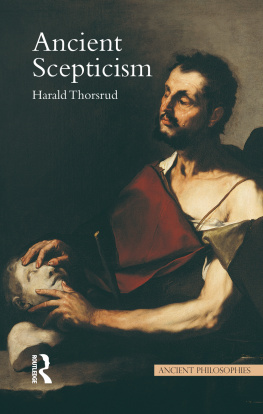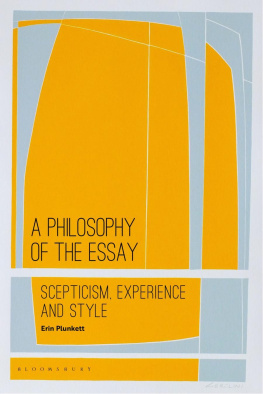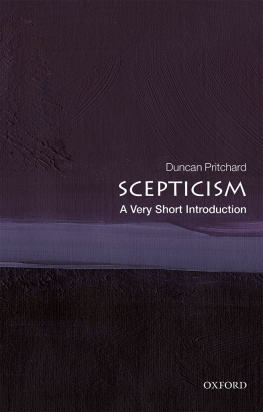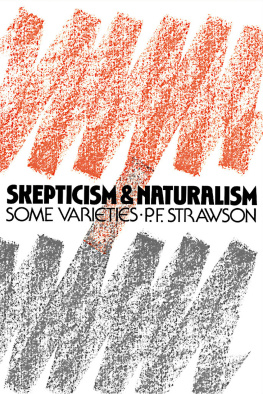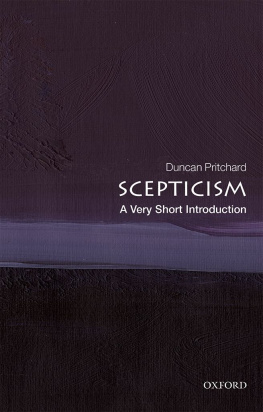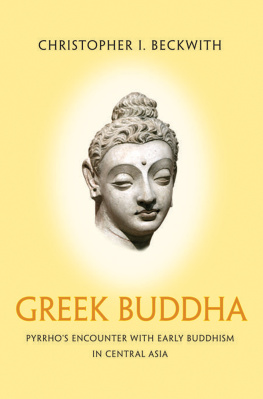Ancient Scepticism
Ancient Philosophies
This series provides fresh and engaging new introductions to the major schools of philosophy of antiquity. Designed for students of philosophy and classics, the books offer clear and rigorous presentation of core ideas and lay the foundation for a thorough understanding of their subjects. Primary texts are handled in translation and the readers are provided with useful glossaries, chronologies and guides to the primary source material.
Published
Ancient Scepticism
Harald Thorsrud
Cynics
William Desmond
Neoplatonism
Pauliina Remes
Presocratics
James Warren
Stoicism
John Sellars
Forthcoming
The Ancient Commentators on Plato and Aristotle
Miira Tuominen
Aristotle
Vasilis Politis
Classical Islamic Philosophy
Deborah Black
Confucianism
Paul Goldin
Epicureanism
Tim OKeefe
Plato
Andrew Mason
Socrates
Mark McPherran
Ancient Scepticism
Harald Thorsrud
First published 2009 by Acumen
Published 2014 by Routledge
2 Park Square, Milton Park, Abingdon, Oxon OX14 4RN
711 Third Avenue, New York, NY 10017, USA
Routledge is an imprint of the Taylor & Francis Group, an informa business
Harald Thorsrud, 2009
This book is copyright under the Berne Convention.
No reproduction without permission.
All rights reserved. No part of this book may be reprinted or reproduced or utilised in any form or by any electronic, mechanical, or other means, now known or hereafter invented, including photocopying and recording, or in any information storage or retrieval system, without permission in writing from the publishers.
Notices
Practitioners and researchers must always rely on their own experience and knowledge in evaluating and using any information, methods, compounds, or experiments described herein. In using such information or methods they should be mindful of their own safety and the safety of others, including parties for whom they have a professional responsibility.
To the fullest extent of the law, neither the Publisher nor the authors, contributors, or editors, assume any liability for any injury and/or damage to persons or property as a matter of products liability, negligence or otherwise, or from any use or operation of any methods, products, instructions, or ideas contained in the material herein.
ISBN: 978-1-84465-130-6 (hardcover)
ISBN: 978-1-84465-131-3 (paperback)
British Library Cataloguing-in-Publication Data
A catalogue record for this book is available from the British Library.
Typeset in Minion.
For her patience, understanding and love, this book is dedicated to Laura: amicus certus in re incerta cernitur.
Contents
When I was a graduate student a slogan was proposed for a department T-shirt: Philosophy. Weve done less in 2,500 years than most people do in a single day. The slogan was rejected. But it reflects a serious sceptical sentiment. When we consider the remarkable progress made by science in the past 400 years, philosophy appears in an unfavourable light. At a minimum, we would like to know why there is so little agreement among professional academics regarding the solutions to philosophical problems, their proper articulation, and even the methods suitable to resolving them.
My desire to find a satisfactory explanation of pervasive disagreement has sustained my interest in the ancient Sceptics. From their arguments and strategies, we can construct various explanations for why philosophers have not and perhaps will not reach consensus. Th ere are, of course, plenty of non-sceptical solutions as well, and I am not convinced that I have a satisfactory explanation yet. But reflecting on the arguments of the ancient Sceptics has proved to be immensely valuable in getting to grips with the broad issue of the limits of reason.
The Sceptics also have some fascinating things to say about the proper response to our rational limitations. These responses are meant to show how Scepticism is a viable position and not merely a set of arguments confined to the study or the classroom. While I cannot say that I have tried to live without beliefs, as the Sceptics suggest we should, their proposals have inspired me to think more clearly about fundamental problems regarding the nature of rational belief and appearances, and the roles they play in action.
It is my hope that this book will encourage readers interested in these and related issues to further their own enquiries. I have tried not to presuppose familiarity with earlier Greek philosophers or with the Sceptics contemporaries, instead supplying the details where necessary. I have aimed at producing a coherent historical narrative in which to situate the development and transmission of ancient sceptical arguments and strategies.
Nearly every portion of this account, however, is controversial. Th is is why I have tried to be thorough in providing references to both primary and secondary sources. The references can always be ignored, but they will be helpful for those interested in pursuing a particular idea, especially given the variety of plausible interpretations that are oft en available. Similarly, the guide to further reading is probably far more extensive than many readers will require. But as it is arranged in sections corresponding to the major figures and periods of ancient Scepticism, I hope it will prove useful for further study.
I had the good fortune to be introduced to the ancient Sceptics by Jim Hankinson and Paul Woodruff, and to Hellenistic philosophy more generally by Stephen White. Th ey were excellent guides, as well as models, and have given me a great deal of encouragement. I am very grateful to the publishers anonymous readers who provided many detailed and insightful comments, as well as to Tim OKeefe, Wilhelm Nightingale and Ralph Anske, all of whom read and commented on the manuscript. Also, my students in a seminar at Agnes Scott College generously offered helpful comments on early drafts of the chapters. Although it is likely that some errors or oversights remain, this book is far better for the revisions I have been able to make in response to this critical attention.
My thanks to Kate Williams for expert copy-editing and to Steven Gerrard at Acumen for seeing this project through and for locating the spectacular painting of Carneades on the cover.
Anonymous
- In Tht. = In Theaetetum (Commentary on Platos Theaetetus)
Aristotle
- NE = Nicomachean Ethics
- Met. = Metaphysics
- Rh. = Rhetoric
Augustine
- Contra Ac. = Contra Academicos (Against the Academicians)
Aulus Gellius
- NA = Noctes Atticae (Attic Nights)
Cicero
- Ac. = Academica (Academic Books)
- Amic. = De Amicitia (On Friendship)
- Att. = Epistularum ad Atticum (Letters to Atticus)
- De Or. = De Oratore (On the Orator)
- Div. = De Divinatione (On Divination)
- Fin. = De Finibus Bonorum et Malorum (On Moral Ends)
- Fat. = De Fato (On Fate)
- Inv. = De Inventione (On [Rhetorical] Invention)
- Leg. = De Legibus (On the Laws)
- ND = De Natura Deorum (On the Nature of the Gods)
- Off. = De Officiis (On Duties)
- Orat. = Orator

